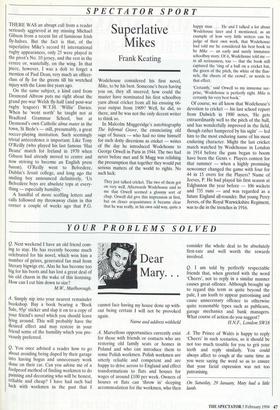SPECTATOR SPORT
Superlative Mikes
Frank Keating
THERE WAS an abrupt call from a reader seriously aggrieved at my missing Michael Gibson from a recent list of luminous Irish fly-halves. But the fact is that, of the superlative Mike's record 81 international rugby appearances, only 25 were played in the pivot's No. 10 jersey, and the rest in the centre or, wastefully, on the wing. In that piece, however, I was a dolt to forget a mention of Paul Dean, very much an officer- class of fly for the greens till his wretched injury with the Lions five years ago.
On the same subject, a kind card from Desmond Albrow puts me right about the grand pre-war Welsh fly-half (and post-war rugby leaguer) W.T.H. 'Willie' Davies. When he 'went north' he taught not at Bradford Grammar School, but at Desmond's own Catholic alma mater in the town, St Bede's — still, presumably, a great soccer-playing institution. Such seemingly trivial antecedence is important. Like Tony O'Reilly (who played his last famous 'Haz Beanz' match for Ireland in 1970 when Gibson had already moved to centre and now striving to become an English press baron). O'Reilly went to Belvedere, Dublin's Jesuit college, and long ago the smiling boy announced definitively, 'Us Belvedere boys are absolute tops at every- thing — especially humility.'
A handful of more scoffing letters and calls followed my throwaway claim in this corner a couple of weeks ago that P.G.
Wodehouse considered his first novel, Mike, to be his best. Someone's been having you on, they all sneered; how could the master have nominated his first schoolboy yarn about cricket from all his ensuing 66- year output from 1909? Well, he did, so there, and he was not the only decent writer to think so.
In Malcolm Muggeridge's autobiography The Infernal Grove, the enunciating old sage of Sussex — who had no time himself for such dotty diversions as cricket — writes of the day he introduced Wodehouse to George Orwell in Paris in 1944. The two had never before met and St Mugg was relishing the presumption that together they would put serious matters of the world to rights. No such luck: They just talked cricket. The two of them got on very well. Afterwards Wodehouse said to me that Orwell seemed a gloomy sort of chap. Orwell did give this impression at first, but on closer acquaintance it became clear that he was really, in his own odd way, quite a happy man . . . He and I talked a lot about Wodehouse later and I mentioned, as an example of how very little writers can be judge of their own work, that Wodehouse had told me he considered his best book to be Mike — an early and surely immature schoolboy story. Of it, Wodehouse told me in all seriousness, too — that the book still captured the 'ring of a ball on a cricket bat, the green of the pitch, the white of the flan- nels, the cheers of the crowd', or words to that effect.
'Certainly,' said Orwell to my immense sur- prise, 'Wodehouse is perfectly right. Mike is certainly his very best book.'
Of course, we all know that Wodehouse's devotion to cricket — his last school report from Dulwich in 1900 notes, 'He gets extraordinarily well to the pitch of the ball, and has wonderfully improved in the field, though rather hampered by his sight' — led him to the most enduring name of his most enduring character. Might the last cricket match watched by Wodehouse in London in 1914 before the guns began to boom have been the Gents v. Players contest for that summer — when a highly promising newcomer changed the game with four for 44 in 15 overs for the Players? Name of Jeeves, P. He had played his first season at Edgbaston the year before — 106 wickets and 735 runs — and was regarded as a future England all-rounder. But young Percy Jeeves, of the Royal Warwickshire Regiment, was to die in the trenches in 1916.


















































 Previous page
Previous page